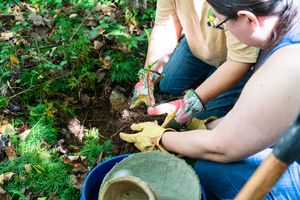
The initiative, held on Sells Road in Salisbury, reflects Catawba’s deep commitment to environmental stewardship and its growing network of sustainability partnerships across the region. Through CPR, Dr. DeJaco and volunteers work with property owners and developers to save native plants before construction begins—digging them up carefully and rehoming them where they can continue to play vital roles in local ecosystems.
When Dr. DeJaco shared the CPR mission with Dr. Lee F. Ball, Jr., Vice President of Sustainability and Executive Director of the Catawba Center for the Environment, he immediately identified a nearby development site as an opportunity for collaboration. He enlisted the help of Catawba’s Center for the Environment Education Outreach Specialist, Isaac Haut ‘24, who reached out persistently to obtain permission to access the land. Thanks to his efforts, the team secured approval to conduct the rescue and bring native plants to new homes on Catawba’s campus.
“Without Isaac’s determination, this opportunity would not have been possible,” said Dr. DeJaco. “His tenacity truly embodies the spirit of our students—curious, compassionate, and committed to doing good for our community and environment.”
Catawba students, faculty, and staff, including members of the Catawba Environmental Stewards, worked side by side with CPR volunteers to identify, dig, and transport plants from the wooded site. Once rescued, the plants were brought to Catawba’s campus learning garden, where they are being housed and carefully tended-pruned, watered, and prepared for permanent planting.
“The plants are currently being cared for in our learning garden until we can identify the best areas on campus for them to thrive,” explained Haut. “Many of the rescued species are shade-tolerant, so our goal is to place them under existing tree canopies in suitable shaded areas across campus. The ideal time for planting will be in November when the pants enter dormancy, which minimizes the risk of transplant shock.”
Looking ahead, Haut envisions additional opportunities for ecological restauration on campus. “I would love to plant another micro forest using many of these rescued plants—mimicking a true North Carolina Piedmont forest,” he said.
“Catawba College has long been a living laboratory for sustainability,” said Dr. Ball. “Efforts like this allow us to conserve biodiversity, beautify our campus, and model what community collaboration for the environment can look like.”
Following the success of this first event, CPR and Catawba plan to host additional plant rescues in the coming weeks, inviting more students and community members to join the effort to protect North Carolina’s natural plants.
Watch Dr. DeJaco discuss the mission of the Constructive Plant Rescue and this collaborative project with Catawba College in a short video interview: https://www.youtube.com/shorts/VPKwquPWqbM.
With a campus-wide commitment to sustainability, from geothermal energy to solar innovation, Catawba continues to lead by example—demonstrating that when we work together, good truly goes far.
About Constructive Plant Rescue (CPR)
Founded by Dr. Carrie DeJaco, CPR is a nonprofit organization dedicated to conserving biodiversity by rescuing native plants from development sites and rehoming them in suitable, sustainable environments. Learn more on their website at https://constructiveplantrescue.org/.
